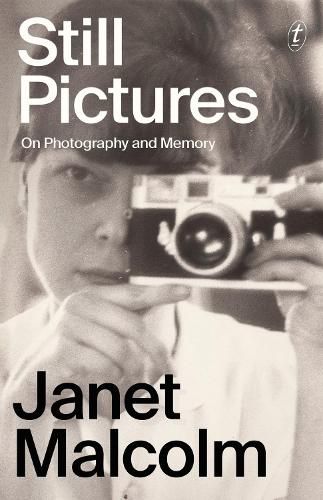Readings Newsletter
Become a Readings Member to make your shopping experience even easier.
Sign in or sign up for free!
You’re not far away from qualifying for FREE standard shipping within Australia
You’ve qualified for FREE standard shipping within Australia
The cart is loading…






For decades, Janet Malcolm’s books and dispatches for the New Yorker and the New York Review of Books poked and prodded at reportorial and biographical convention, gesturing towards the artifice that underpins both public and private selves. In Still Pictures, she turns her gimlet eye on her own life.
Beginning with the image of a morose young girl on her way from Prague to New York in 1939, to fitful early loves and her fascination with what it might mean to be a ‘bad girl’, Malcolm assembles a composite portrait of a New York childhood, one that never escapes the tug of Europe and the mysteries of fate and family. Later, she delves into the world of William Shawn’s New Yorker and the infamous libel trial that saw her become a character in her own drama.
Written with Malcolm’s peerless skill and sharp wit, this memoir from a titan of American letters is unlike any other.
$9.00 standard shipping within Australia
FREE standard shipping within Australia for orders over $100.00
Express & International shipping calculated at checkout
For decades, Janet Malcolm’s books and dispatches for the New Yorker and the New York Review of Books poked and prodded at reportorial and biographical convention, gesturing towards the artifice that underpins both public and private selves. In Still Pictures, she turns her gimlet eye on her own life.
Beginning with the image of a morose young girl on her way from Prague to New York in 1939, to fitful early loves and her fascination with what it might mean to be a ‘bad girl’, Malcolm assembles a composite portrait of a New York childhood, one that never escapes the tug of Europe and the mysteries of fate and family. Later, she delves into the world of William Shawn’s New Yorker and the infamous libel trial that saw her become a character in her own drama.
Written with Malcolm’s peerless skill and sharp wit, this memoir from a titan of American letters is unlike any other.
The cliché says that a picture is worth a thousand words, but it’s hard to imagine erudite and prolific Janet Malcolm ever letting a photo do all the talking. In the posthumously published Still Pictures: On Photography and Memory, Malcolm pairs a personal photo with small vignettes – snapshots, if you will – of her life: ‘The events of our lives are like photographic negatives. The few that make it into the developing solution and become photographs are what we call our memories.’
The collection starts with the image of a family of Czech Jews. A mrzutý (sullen, sulky, peevish) five-year-old Malcolm standing between her parents on a train, making their way from Prague to New York in 1939, narrowly avoiding the Holocaust. Malcolm goes on to chronicle her childhood in New York, her early love affairs, and her time at William Shawn’s New Yorker, with most pieces accompanied by a photo that sparks and frames a specific memory.
Malcolm disparages the concept of a linear autobiography – ‘The past is a country that issues no visas. We can only enter it illegally’ – and instead provides only small glimpses into her life, turning, however briefly, her analytical gaze on herself.
Admittedly, I wouldn’t recommend this one for new readers of Malcolm. In true journalistic fashion, Malcolm’s writing is more successful when she turns her literary and psychoanalytical eye on another subject. Perhaps unsurprisingly, she tends to be less critical of herself than she is of say, Anna Freud or Ted Hughes. As she herself admits, she ‘would rather flunk a writing test than expose the pathetic secrets of [her] heart.’ Nevertheless, diehard fans, myself included, will find it well worth the read.
Get rare insight into the lives of well-known figures with the latest biography and memoir.